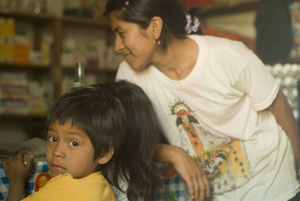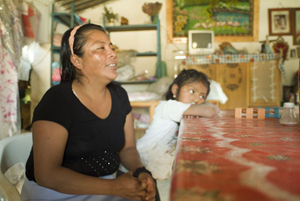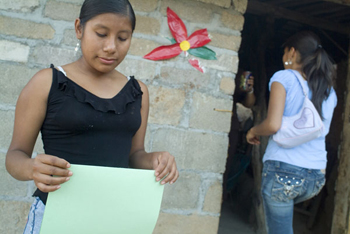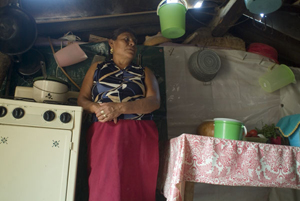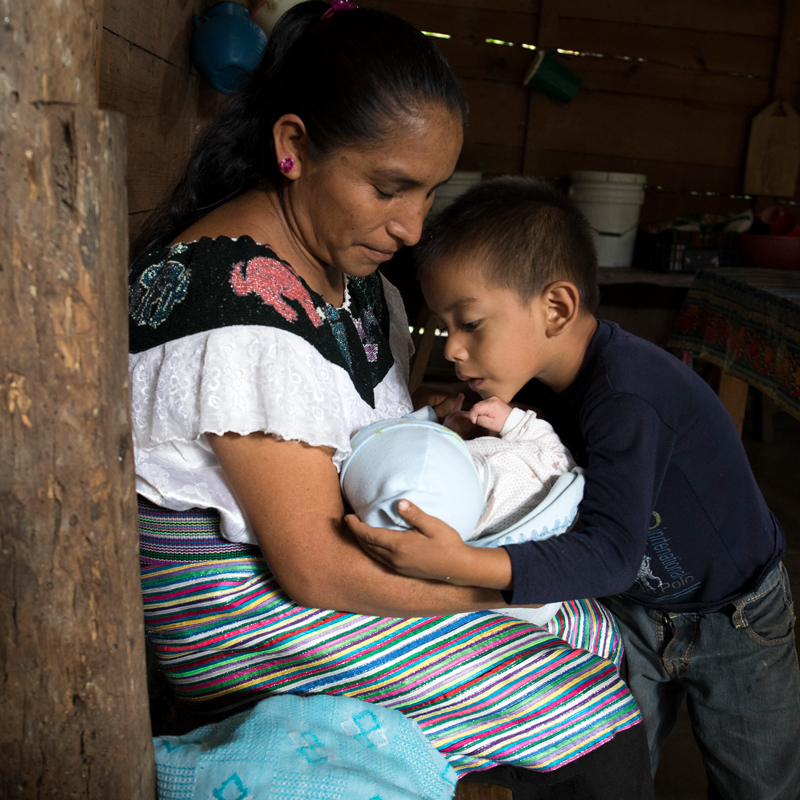The John D. and Catherine T. MacArthur Foundation first began making grants in Mexico in 1986 and opened an office in Mexico in 1991. Today, MacArthur provides approximately $6 million in grants each year to address two core issues: population and reproductive health and human rights.
Contents
President's Message
MacArthur's Population & Reproductive Health Grantmaking in Mexico
Reducing Maternal Mortality in the "Land of Women": K'inal Antsetik
Enabling Mexico's Youth to Make Healthy Choices: Salud y Género
Grants to Reduce Maternal Mortality and Morbidity
Grants to Advance Young People's Sexual and Reproductive Health & Rights
MacArthur's Human Rights Grantmaking
Monitoring Policy Performance, Defending Human Rights: Tlachinollan & Institute for Security and Democracy (Insyde)
Grants for Human Rights
Staff & Contact Information
Message from the President
I am pleased to introduce this report on the work in Mexico of the John D. and Catherine T. MacArthur Foundation.
MacArthur began making grants in Mexico in the mid-1980’s and opened an office in Mexico City in 1991. Over the years, we have supported 185 individuals and organizations in Mexico with grants totaling nearly $70 million. MacArthur’s current program comes in two parts:
-
Our population work seeks to improve women’s health by reducing maternal mortality and to educate young people about their sexual and reproductive health and rights and related responsibilities.
-
Our human rights program seeks to improve police performance and strengthen the ombuds system. We also support strategic litigation to advance Mexico’s compliance with international standards.
The MacArthur Foundation supports research, policy analysis, demonstration projects, and performance monitoring. We work intensively with civil society groups, but also with government agencies prepared to change and improve.
We know that this is an important time of transition for Mexico and we are pleased to make common cause with talented individuals and organizations committed to building a democratic Mexico that distributes the fruits of economic growth fairly.
The MacArthur Foundation seeks to be transparent in everything it does. We welcome your questions and comments, which may be sent to [email protected].
Jonathan F. Fanton
President
Overview of MacArthur’s Population & Reproductive Health Grantmaking in Mexico
MacArthur’s grantmaking in this area reflects a comprehensive approach to reproductive and sexual health and rights, one that places women's well-being at the center of population policy and emphasizes the rights of individuals to determine and plan family size. The Foundation was an early supporter of this comprehensive framework, which was adopted by 180 countries at the International Conference on Population and Development in Cairo in 1994; this framework continues to inform and orient MacArthur’s work.
MacArthur’s population and reproductive health grantmaking in Mexico promotes a more secure and sustainable world by –
-
Reducing maternal mortality and
-
Advancing young people’s sexual and reproductive health and rights.
Reducing Maternal Mortality
The MacArthur Foundation works to reduce maternal mortality in Mexico by supporting local organizations that raise awareness about the issue and improve the quality of health care in rural areas of Oaxaca, Chiapas, and Guerrero. Reducing maternal mortality is a worthy goal in itself, but it is also an important indicator that women are receiving the reproductive health services they need. When they do receive such services, they are more likely to make informed, sensible, and safe choices for themselves and their families.
MacArthur also supports civic organizations that advocate for needed changes in policies directly related to maternal health and that help build public support for their implementation. To reduce maternal mortality MacArthur seeks to increase the chances that women will have safer, planned pregnancies and deliveries. In so doing, the Foundation’s grantmaking can enhance the life chances of current and future generations of Mexicans.
Reaching Out to Mexico’s Youth
Nearly 32 million people between the ages of 10 and 24 live in Mexico today, the most in this age group in the country’s history. The average Mexican marries at age 19, and those between 15 and 19 account for nearly one out of every six births. In many rural and indigenous communities, the rates are even higher. One of the most serious challenges facing these young people is early pregnancy and its consequences, including maternal mortality.

When young men and women have access to good information and health care, they are more likely to make sensible choices. The more information young people have, the more they improve their family’s health and income, delay the age of marriage, and avoid unwanted pregnancies. MacArthur’s grantmaking increases the availability of high-quality sexuality education materials and confidential, youth-friendly health services. The Foundation supports pilot educational programs for youth in and out of school and invests in programs that offer an enabling environment in which young people can seek health services.
K’inal Antsetik: Reducing Maternal Mortality in the “Land of Women”
Because I love myself, and because I am needed, I should not die when bringing new life into the world.
Indigenous women in Chiapas, Guerrero, and Oaxaca are beginning to embrace this message, which is delivered effectively by K’inal Antsetik, a local organization that works to reduce maternal mortality in Mexico’s indigenous communities.
The isolated rural areas of these states have the highest maternal mortality levels in the country. For indigenous women in these regions, two forces combine to heighten risk. The first is a dynamic that excludes indigenous people in Mexican policymaking. “Infrastructure, roads, health care, and schools have not been developed for them,” says Executive Director Nellys Palomo, “and poverty runs deep.” The second factor is deeply entrenched social norms in these communities. “These usos y costumbres [customary laws] govern how people behave, and they also govern a woman’s reproductive and health decisions,” says Palomo. “Decisions about when and how many children a woman has are not hers to make. Husbands and communities make the decisions, and sometimes these decisions will result in her illness and death.”
K’inal Antsetik, which means “Land of Women” in the Tzeltal Mayan language, works closely with the communities to change these social norms, and seeks new policies and programs that can reduce maternal mortality. “We are working with the women,” says Palomo, “to find out which of the customary laws they find oppressive, and we are working with men and community leaders to improve their awareness and gain their cooperation in addressing maternal mortality.”
Citing the Mexican Constitution, K’inal Antsetik is drawing attention to the rights of indigenous women in order to advance reproductive health issues. By organizing national forums held on site in communities most affected by maternal mortality, K’inal has introduced state and federal policymakers to the women themselves and to the conditions in their communities.
As a result of their efforts, the topic of maternal mortality among indigenous populations is now a part of the national conversation about indigenous rights and development, “whereas five years ago,” says Palomo, “it was not discussed, and indigenous women were not considered.”
In addition to raising awareness, K’inal Antsetik is on the frontlines demanding justice by bringing medical negligence cases to court and setting legal precedents, which will have lasting effects in Mexico. “This is an important strategy for guaranteeing that the health system actually does provide quality health care and preventing this from happening to other women in the future,” says Palomo.
“There is a new generation of indigenous women who have made their own decisions about reproductive rights, and this is very different from before,” says Palomo. “I can think of one case of a young indigenous woman who pursued an education, a Master’s degree, and returned to her community. Her life partner is well educated and an activist for indigenous rights. Together they model a different kind of parenting; they share child care and he changes diapers. It is their youth, their education, and their exposure to a different way of life that is bringing change to their community.”
Salud y Género: Enabling Mexico’s Youth to Make Healthy Choices
Most parents squirm at the prospect of talking about sex with their children. For that matter, “teachers, too, turn the page over quite quickly,” says Benno de Keijzer, founder of Salud y Genero (“Health and Gender”) in Veracruz and Queretaro. “Unfortunately, it’s a lost opportunity.”
Salud y Genero is working to keep teachers on the page a little longer by creating and offering training and education on reproductive health and rights for educators and others working with or serving youth, including authorities and health service providers from the federal and state-level Ministries of Health.
Until recently, Mexico offered family planning and sex education only to married women, and the topic remains unmentionable in many circles. But such information, says De Keijzer, is imperative if young people are to make smart choices and stay healthy; and it is critical for Mexico’s future that these conversations take place. Mexico is the second most populous country in Latin America and has experienced a baby boom. Therefore, young people’s reproductive health choices will have an enormous impact on the country’s future social and economic development.
Salud y Género tailors the content of its training by gender and recognizes the individual characteristics of youth. “Especially with younger boys and girls, the more common family planning approach is insufficient,” says de Keijzer, a medical doctor and anthropologist whose work in the field of male behavior and masculinity is well known. “Youth don’t feel at home when they go to a family planning service because they’re not planning a family.”
The organization trains facilitators to engage boys and girls separately to create an open atmosphere where they can speak freely about how culture and gender affect their behavior. “Then later we bring them together and the boys listen to girls and vice versa. But it’s important that they feel able to express themselves within their gender group first,” says de Keijzer.
These conversations are eye-opening. In one school, a 14-year-old girl knew that boys want to get close to girls, but why, she asked, did they have to do it by kicking them or stealing from them or by other forms of violence. “For the boys to hear that was very liberating in some way,” says De Keijzer, one of the first recipients in Mexico of support from MacArthur’s Fund for Leadership Development in Mexico, which recognized and supported talented, promising individuals. “They raised their eyebrows, but they also listened to how girls feel, realizing that there might be other ways to get close. That was interesting to them, especially because those things are not talked about in school.”
Salud y Genero has increased awareness of the important role men must play in efforts to improve the sexual and reproductive health of women in Mexico. It collaborates with the Ministry of Health to ensure that federal and state authorities embrace the new policies and that local providers are qualified to implement them.
Salud y Género has trained more than 11,000 professionals in Mexico with the potential to reach millions of youth. In collaboration with colleagues in Brazil and the United States, Salud y Genero created outreach and education models now used around the globe, including in India.
Grants to Help Reduce Maternal Mortality and Morbidity in Mexico
Asesoria, Capacitacion y Asistencia en Salud, San Cristobal de las Casas, Mexico
$180,000 in support of developing social outreach strategies for engaging rural indigenous communities in preventing maternal death (over three years).
Centro de Investigaciones en Salud de Comitan, Comitan, Mexico
$190,000 for activities to reduce maternal mortality and morbidity in the southern border region of Chiapas State (over three years).
Comunicacion e Informacion de la Mujer, Mexico City, Mexico
$150,000 in support of increasing media coverage of maternal mortality and morbidity (over three years).
Consorcio para el Dialogo Parlamentario y la Equidad, Asociacion Civil, Mexico City, Mexico
$170,000 in support of improving parliamentary debate and knowledge of maternal mortality and morbidity, including Mexico’s national and international commitments related to reducing the maternal mortality ratio (over three years).
Equidad de Genero
Ciudadania, Trabajo y Familia, Mexico City, Mexico
$190,000 to monitor and disseminate information about Mexico's fulfillment of the Millennium Development Goal to decrease maternal mortality by 75 percent by 2015 at the federal level and in three states (over three years).
Foro Nacional de Mujeres y Politicas de Poblacion Capitulo Distrito Federal, Mexico City, Mexico
$150,000 in support of improving federal public policy for maternal mortality and morbidity reduction and increasing visibility of the issue among policymakers (over three years).
Foro Nacional de Mujeres y Politicas de Poblacion Capitulo Oaxaca, Oaxaca, Mexico
$190,000 in support of increasing access to emergency obstetric care in the Southern Sierra region of Oaxaca state (over three years).
Fundar, Centro de Analisis e Investigacion, Mexico City, Mexico
$270,000 in support of research and dissemination of information regarding public budgetary allocations for maternal health and reducing maternal death (over three years).
Ipas, Chapel Hill, NC
$295,000 for efforts to increase access to legal abortion services in Mexico (over three years).
K'inal Antsetik, Mexico City, Mexico
$180,000 in support of decreasing maternal mortality among indigenous women of Chiapas and Guerrero (over three years).
Mexico National Safe Motherhood Committee
Comite Promotor Por Una Maternidad Sin Riesgos En Mexico, Mexico City, Mexico
$180,000 in support of efforts to decrease maternal mortality in Mexico (over three years).
Nueve Lunas, Oaxaca, Mexico
$150,000 for a project to reduce maternal deaths in Oaxaca State (over three years).
Red Ciudadana Feminista de Mexico: Region Centro, Santiago de Queretaro QRO Mexico
$80,000 for efforts to improve access to legal abortion in six central states in Mexico (over three years).
Rosario Castellanos - Grupo de Estudios Sobre la Mujer, Oaxaca, Mexico
$210,000 in support of scaling up a training model for preventing maternal mortality with government health workers from the Oaxaca Ministry of Health and IMSS Oportunidades (over three years).
Sociedad Mexicana Pro Derechos de la Mujer, Mexico, Mexico
$470,000 in support of a program to strengthen the leadership capacity of indigenous women to decrease maternal mortality and improve the population's reproductive health (over three years).
Sociedad Mexicana Pro Derechos de la Mujer, Mexico, Mexico
$250,000 in support of local organizations’ initiatives for improving youth reproductive and sexual health or decreasing maternal mortality (over 34 months).
Working Group for Safe Motherhood in Chiapas, San Cristobal de las Casas, Mexico
$370,000 in support of a pilot model to reduce maternal mortality in Chiapas (over three years).
Grants to Advance Young People’s Sexual and Reproductive Health and Rights in Mexico
Afluentes, Mexico City, Mexico
$160,000 to strengthen reproductive and sexual health services for young people through two existing government health programs (over three years).
Afluentes, Mexico City, Mexico
$50,000 in support of research on NGO-government collaboration in the field of sexual and reproductive health and rights in Mexico (over two years).
Article 19, London, United Kingdom
$30,000 in support of improving access to government information related to youth sexual and reproductive health services in Mexico.
Catolicas por el Derecho de Decidir, Mexico City, Mexico
$270,000 to improve state-level implementation of federal policy that promotes young people’s sexual and reproductive health and rights in Mexico (over three years).
Chiltak, San Cristobal de las Casas Chiapas Mexico
$150,000 in renewed support for improving youth sexual and reproductive health and rights in the state of Chiapas (over three years).
Democracia y Sexualidad, Mexico City, Mexico
$240,000 in support of a national sexuality education campaign and improvement of government reproductive and sexual health services to youth (over three years).
ELIGE, Red de Jovenes por los Derechos Sexuales y Reproductivos, Mexico City, Mexico
$150,000 for improving youth sexual and reproductive health and rights in Mexico (over three years).
Facultad Latinoamericana de Ciencias Sociales, Mexico City, Mexico
$30,000 to support design of a national survey on sexuality education.
Fundacion Mexicana Para la Planeacion Familiar, Mexico City, Mexico
$250,000 for the consolidation of a model to promote the sexual and reproductive health of rural and indigenous young people in Oaxaca and Guerrero (over three years).
Grupo de Informacion en Reproduccion Elegida, Mexico City, Mexico
$270,000 in support of the defense and promotion of reproductive rights in Mexico through recording, documenting and litigating reproductive rights violations and training government, NGOs, and members of the local community (over three years).
Instituto de Liderazgo Simone de Beauvoir, Mexico City, Mexico
$150,000 to implement a distance training program for individuals working in the field of young people’s sexual and reproductive health and rights (over three years).
Investigacion en Salud y Demografia, Mexico City, Mexico
$255,000 in support of strengthening NGO skills in monitoring and evaluating work to advance youth sexual and reproductive health and rights and decrease maternal mortality (over three years).
Investigacion en Salud y Demografia, Mexico City, Mexico
$200,000 to continue and disseminate a longitudinal survey on sexual and reproductive health of young women ages 12-19 in rural communities of Oaxaca (over 27 months).
Letra S, Sida, Cultura y Vida Cotidiana, Mexico City, Mexico
$250,000 to increase media coverage of young people’s sexual and reproductive health and rights (over three years).
Marie Stopes Mexico, San Cristobal de las Casas, Mexico
$150,000 in renewed support for improving youth sexual and reproductive health and rights in the state of Chiapas (over three years).
Observatorio Ciudadano de Politicas de Ninez, Adolescencia y Familias, Mexico City, Mexico
$50,000 in support of the development of an internet-based networking system for young leaders involved in IMSS Oportunidades' rural adolescent program.
Salud Integral para la Mujer, Mexico City, Mexico
$190,000 in support of consolidating and scaling up a model for increasing use of reproductive and sexual health services by public high school students (over three years).
Salud y Genero, Xalapa, Mexico
$190,000 to improve the provision of youth friendly reproductive and sexual health services by the Ministry of Health (over three years).
Sistema Nacional de Promocion y Capacitacion en Salud Sexual, Mexico City, Mexico
$300,000 for projects promoting the reproductive and sexual health and rights of young people (over three years).
Thais, Consultoria en Desarrollo Social, Mexico City, Mexico
$225,000 in support of scaling up and refining a youth outreach model for rural adolescents, linked to IMSS Oportunidades (over three years).
Thais, Consultoria en Desarrollo Social, Mexico City, Mexico
$25,000 in support of systematization of the IMSS Oportunidades model for youth and sexual and reproductive health and rights.
Unidad de Atencion Sicologica, Sexologica y Educativa para
el Crecimiento Personal, Merida, Mexico
$150,000 in support of documenting and scaling up a model of reproductive and sexual health services for young people (over three years).
Overview of MacArthur’s Human Rights Grantmaking in Mexico
Mexico is embracing a system of multi-party democracy after decades of single party rule. Passage of the Freedom of Information law, cooperation between the Office of the UN High Commissioner for Human Rights and the Mexican government to review and improve Mexico’s human rights situation, and the vigorous involvement by civil society organizations in issues may provide new openings for deepening respect for human rights. Mexico is moving toward more open government, more collective decision making, and greater accountability. The MacArthur Foundation is contributing to reform by strengthening the capacity of local organizations to promote human rights and engage constructively with government to strengthen laws and institutions.
Grantmaking seeks to build national and local organizations and networks that interact with government to help shape national human rights policy, monitor and document human rights abuses, and seek redress for violations. In an effort to strengthen the culture of human rights in Mexico, support is given to leading human rights groups working broadly in Mexico that are characterized by intellectual leadership, methodological rigor, strategic vision, and collaboration with others, both domestic and international.
The justice system, whose functioning so directly influences the level of respect for Mexicans’ human rights, is a primary focus of human rights advocacy. Grants support work at the state and national level to implement human rights law in Mexico and to incorporate international human rights standards. Strategic litigation is pursued through national courts and, when appropriate, the Inter-American Commission and Court.
Particular attention is given to improving the police, an institution that is the face of government for many people. Grants fund efforts to improve police accountability and respect for human rights and to build knowledge and data about policing in Mexico as a basis for policy.

Strengthening the public human rights commissions or ombudsmen as a remedy for those who experience human rights violations is another emphasis. MacArthur grants support the professional development and independence of ombudsmen and tracking of data on performance.
Grantmaking also recognizes that opportunities to spark change may be greater, in some cases, when pursued at the state level. MacArthur works closely with a number of human rights groups in the states of Guerrero and Jalisco to implement model reforms and seek redress for local human rights problems.
Tlachinollan: Institute for Security and Democracy (Insyde) and Fundar Centro de Análisis e Investigación
Monitoring Police Performance, Defending Human Rights
Eighteen year-old Socrates Tolentino was arbitrarily detained by the police in his home state of Guerrero. He was taken to a municipal jail, where he was beaten to death in his cell. Although the death was initially labeled a suicide, Tlachinollan, a local human rights group, had the body exhumed and ordered an autopsy, which proved that Socrates had died a violent death at the hands of the police. The case was sent to the United Nations and orders of arrest were issued against municipal authorities, including the police commanders; one of them has been detained and the rest are on the run.
“In Guerrero,” says Ana Paula Hernandez, deputy director of Tlachinollan Human Rights Center, “you have a context of extreme poverty and marginalization, large indigenous populations, considerable corruption—and a sense of impunity.” Tlachinollan seeks to prevent human rights abuses that arise from these conditions.
The key to Tlachinollan’s success, says Hernandez, is twofold: it works to strengthen indigenous organizations from within, and it works with governments to change policies and shape reforms. “It’s critical to open a level of dialogue with authorities,” says Hernandez. “It’s very clear that we must have a much more structural impact on the causes of these human rights violations, and we’re only able to do that when we work together.”
A partner in this work, the Institute for Security and Democracy (Insyde) is the first national organization in Mexico to focus exclusively on public security concerns. Insyde analyzes police commands in Mexico and seeks to improve systems for police oversight and accountability, helping to ensure that police function impartially, comply with laws, and respect human rights.

Another group involved in this effort, Fundar, headed by some of the country’s leading social scientists, keeps pressure on the government to be transparent and accountable. Through careful research and analysis, it monitors corruption, tracks improper use of public funds, and develops accountability measures, all with an eye toward protecting and supporting marginalized populations. Fundar approaches its work not only as an outside critic, but when possible as a partner with government. The group was recognized for its efforts by a 2006 MacArthur Award for Creative and Effective Institutions.
All three groups are working together to develop a police monitoring system that tracks performance and identifies patterns of abuse, root causes, and potential solutions.
“We’re building indicators of police performance, measured from one year to the next, to see whether the situation has improved and how police units are improving in their internal practice,” says Jorge Romero, Executive Director of Fundar. “We bring this information to legislators and other decision makers so they get a better picture of what’s happening on the ground.”
Creating this data at the municipal level is a significant breakthrough for the field. “With this information, we will be able to identify a very specific picture of how police officers respond to crime,” says Romero.
“Working with police doesn’t mean that you’re going to stop denouncing human rights violations,” says Hernandez. “But we have to work together to get to know their internal structure and how it might be leading to human rights abuses.”
Ultimately, the project to create a police monitoring system in Guerrero will be a model for other Mexican states. In fact, discussions are already underway to set up monitors in Mexico City and in the southern region near the border with Guatemala.
Human Rights Grants in Mexico
Academia Mexicana de Derechos Humanos, Mexico City, Mexico
$210,000 in support of monitoring and publicizing information about the work of human rights commissions in eight Mexican states (over three years).
Center for Justice and International Law
Regional Office for Central America and Mexico, San Jose, Costa Rica
$300,000 in support of the promotion and defense of human rights in Mexico through the use of the Inter-American system for the protection of human rights (over three years).
Centro de Derechos Humanos de la Montana, Tlachinollan, Tlapa de Comonfort, Mexico
$320,000 to support the defense of the human rights of the indigenous people of the Mountain and Costa Chica regions of Guerrero (over three years).
Centro de Derechos Humanos Miguel Agustin Pro Juarez, Mexico City, Mexico
$90,000 to support the defense of paradigmatic cases of human rights violations in Mexico in national and international courts.
Centro de Derechos Humanos Fray Francisco de Vitoria, Mexico City, Mexico
$120,000 in support of legal assistance and the development and monitoring of the National Human Rights Program (over three years).
Centro de Investigacion para el Desarrollo, Mexico City, Mexico
$248,000 in support of a diagnostic of policing in Mexico in the context of national criminal justice reform (over three years).
Centro de Investigacion y Docencia Economicas, Mexico City, Mexico
$460,000 in support of the establishment of a policing research network in Mexico to strengthen programs for police reform (over three years).
Comision Mexicana de Defensa y Promocion de los Derechos Humanos, Mexico City, Mexico
$190,000 for activities to strengthen human rights in Mexico (over three years) ( 2004) and $25,000 in support of the implementation of the International Criminal Court in Mexico.
Fundar, Centro de Analisis e Investigacion, Mexico City, Mexico
$450,000 in support of strengthening the public human rights commissions (over three years).
Fundar, Centro de Analisis e Investigacion, Mexico City, Mexico
$300,000 in support of Citizen Monitoring of Police and Law Enforcement Bodies in Guerrero (over three years).
Guerrero Human Rights Network, Chilpancingo, Mexico
$250,000 to support the strengthening of the legal defense of human rights in the state of Guerrero (over three years).
Instituto Mexicano para el Desarrollo Comunitario, Guadalajara, Mexico
$320,000 to support the creation of a formal human rights network in the state of Jalisco (over three years).
Instituto para la Seguridad y la Democracia A.C., Mexico DF Mexico
$650,000 in support of strengthening police accountability and civil society capacity building (over three years).
Instituto para la Seguridad y la Democracia, Mexico City, Mexico
$320,000 in support of building models for police accountability and civil society capacity building (over two years).
Instituto Tecnologico Autonomo de Mexico Centro de Estudios de Derecho Publico, Mexico City, Mexico
$400,000 in support of monitoring and evaluating the performance of Mexico's National Commission for Human Rights (over three years).
Red Nacional de Organismos Civiles de Derechos Humanos
"Todos los Derechos para Todos", Mexico City, Mexico
$340,000 in support of activities to improve human rights in 20 Mexican states (over three years).
Sin Fronteras, Mexico City, Mexico
$300,000 in support of activities to strengthen human rights protection for migrants and refugees in Mexico (over three years).
United Nations
Office of the High Commissioner for Human Rights, Geneva, Switzerland
$250,000 to improve human rights in Mexico (over two years).
Universidad de Chile
Instituto de Asuntos Publicos, Santiago, Chile
$170,000 in support of the establishment of a policing research network in Mexico in order to strengthen programs for police reform (over three years).
Universidad IberoAmericana, Mexico City, Mexico
$380,000 in support of a Human Rights Program (over three years).
MacArthur Foundation Staff Working on Issues on Mexico
Mexico Staff
Ana Luisa Liguori
Director, Mexico Office
Sharon Bissell
Program Officer
Population and Reproductive Health Area
María Elena Casillas
Program Administrator
Alvaro Camacho
Driver and Office Assistant
Chicago Staff
John Hurley
Vice President, Global Security and Sustainability
Judith Helzner
Director, Population and Reproductive Health
Mary Page
Director, Human Rights and International Justice
Ann Blanc
Program Officer, Population and Reproductive Health
Raoul Davion
Program Officer, Human Rights and International Justice
Gabriela Suárez
Program Administrator
Thom Skoog
Program Administrator
Quinn Hanzel
Program Assistant
Laura Young
Program Associate
Contact Information for Mexico Office
Mexico
MacArthur Foundation México
Vito Alessio Robles 39-103
Colonia Ex-Hacienda de Guadalupe, Chimalistac
México, D.F. 01050
México
Phone and Fax: (52-55) 3004-1692
E-mail: [email protected]
www.macfound.org



